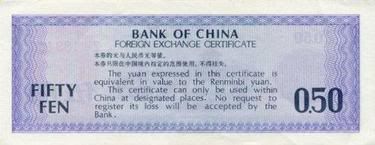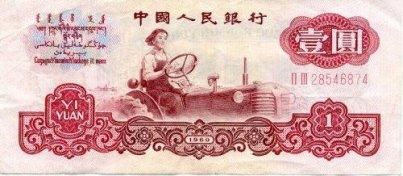China Stories Pt. 5: Change a Money?
In China in 1989, the Yuan was not freely convertible. You could not get it outside the country, and if you took it out of the country with you, you couldn't convert it into other currency. Furthermore, when you went to exchange Yuan back into foreign currency, you had to have receipts showing you had exchanged at least that much money into Chinese currency; in effect, you had to show that you were taking less money out than you had brought in.
Back then there were actually two currencies. One was "the People's currency," called "reminbi," or simply "RMB." ("Yuan" is the formal name of the currency, but nobody calls it that colloquially.) The other was "Foreign Exchange Certificates," or "FEC." FEC was for foreigners, and RMB was for local Chinese. Many foreign goods, such as TVs and washing machines, were only for sale at certain stores, and those stores only accepted FEC. So if a local wanted to buy an American washing machine, they might have to go to the "Friendship Store**."And they would have to have FEC.
The exchange rate for the FEC was held artificially low, so in effect foreigners were overcharged for everything. Meanwhile locals wanted the FEC, because they needed it to buy the washing machine. Foreign students didn't want to be overcharged, so we wanted the RMB. Thus, there was a flourishing black market exchanging FEC for RMB.

Back of a 50 cent Foreign Exchange Certificate. Zzz.

Front of a 1 RMB note. Woman driving tractor. Much cooler than FEC.
We had our own nickname for the currency. Since "RMB" sounded like "R & B," as in rhythm and blues, we called RMB "rhythm and blues," or just "rhythms." As in, "Hey, would you mind paying for the beer? I'm all out of rhythms."
(I don't know if any other foreign students did this, but my friends and I did. Maybe we were just weird. Really, don't discount that possibility.)
Here's how I got my rhythms:
I went to the bank, and exchanged money - say, a US$100 traveler's check. For simplicity's sake, let's say I received 360 FEC. I then took my little wad of monopoly money and headed out the small south gate of the University, into the winding streets of the surrounding district, Haidian. In Haidian, I wandered around. There were shops - a book store, a bike shop, a tea shop. There were outdoor food stalls. There were people playing pool. Pool was very popular then. Since a ban on it had only recentlly been lifted, there were pool tables set up outside on sidewalks all over the city. Eventually I spotted My Guy.
My Guy was about 5' 7", with black hair. (Yes, I know I just described about 400 million men in China.) He had longish, thinning hair, and a wispy beard. He was sort of tough looking, in his leather jacket, but not really menacing. (Kind of like watching The Wild Bunch or West Side Story today. You say, "aww, remember when we found that threatening?") People did get have trouble occasionally, but it wasn't a major concern.
He stopped playing pool and walked over to me.
"Change a money?" he asked.
Then we did the dance. He threw out a number.
"1.6," he said, meaning he'd give me 1.6 RMB per 1 FEC.
"No way! That's way too low! I got 2 to 1 yesterday!" I replied, feigning indignance.
He looked me skeptically. (And rightly so, since I was lying. I had gotten 1.8.)
We went through another iteration, really more of a formality.
"1.7."
"1.9."
Then we arrived where we both knew we would end up anyway: 1.8. I gave him the 360 FEC, and he counted out 650 RMB, peeling the bills off a massive roll.
Yee-haa! It was like I had just gotten a 45% discount on everything in China (outside the Friendship Store). Well, actually, it felt like we had just avoided being fleeced by China.
It wasn't always easy, because not everyone wanted to give us the 45% discount. Foreigners were only supposed to use FEC, unless they had a special card called (ironically enough) a "green card." Green cards were for long-term students or foreigners being paid in RMB, such as teachers. Still, RMB was widely used by foreign students. Even though my classmates and I didn't have green cards, we finessed it most of the time. Most of the time, but not always.
One time I went out with a group of friends for dinner across town. Afterwards, we were looking for a taxi back to the University. A driver stopped.
"FEC or RMB?" he asked.
"RMB," we said. "We're students."
And off he drove. The University district was a long way out, and this guy wasn't going to go there for RMB. Finally a taxi picked us up without asking us FEC or RMB, and we didn't volunteer it. The driver clearly thought he was getting FEC. When we arrived back at the dorm, my friend Randy (the schoolteacher), handed the driver RMB. The driver was dejected. He insisted that we were foreigners, and that we must pay in FEC. Randy refused, got out of the car and started towards the dormitory. The driver became livid, and pursued Randy. He demanded to see his green card. Randy kept walking. The driver grabbed Randy, and they exchanged blows. Nothing big, but the driver had to be extremely angry to engage in that kind of spectacle: fighting with a foreigner was a big deal. No good could come of it. Eventually he left, hurling obscenities and empty threats as he did.
On one hand, I felt bad for the driver, since he didn't get what he thought he would get. On the other hand, "what he thought he would get," seemed to us to be a big rip-off. And we got ripped off and price-gouged enough that it was hard to feel bad for the guy.
Even when we used RMB, we would be overcharged. I'd walk through an open air market and feel like a big pinata full of money. The fruit vendor's eyes would light up, thinking, "I wonder just how ridiculously high a price I can charge this guy for a pear."
*There were some exceptions. You could exchange FEC at the Bank of China in Hong Kong. Not sure where else you could do that.
**Nice name, huh? The Friendship Store, at least the main one, was on Jianguomanwai Avenue, near the embassies. It was useful for buying little luxuries such as english language books and good coffee. These things were not widely available in China in 1989. More on that to follow.



7 Comments:
Please keep writing! The stories are very interesting and I am planning a trip to China in the fall. Having this background will make it all the more amazing...
Great writing. I am home sick so enjoying a vicarious trip to China.
I love this. If you ever want to feel like you're utterly fascinating I'd love to buy you a coffee and just listen to stories about what it's like to live in China. I've never been out of the country and am really enjoying seeing your experiences.
love these stories!!! keep em coming...
I was in Southern China for a month in 1992, so your stories remind me of that fun and interesting trip. I love that you called the RMB "rhythm". I remember the little battles over using FEC v. RMB.
Even now, with no FEC, getting money in China can still be a drama. Sure, in Shanghai & Beijing, you can use the ATM to get money out, but the city I was living in (Wuhan - 8 million people) had no ATMs that worked with foreign cards.
So that meant going to the bank for an over-the-counter withdrawal on a credit card, using your passport as ID. And there is only one bank you could do it at in the whole damn city. Convenient, huh?
And the whole process (from leaving the office to returning) would take about an hour and a half, and involve no fewer than 4 bank staff. Needless to say, I would only go to the bank once a month and withdraw a huge wad of cash all at once, which all of the foreigners would refer to as a "brick." As in, "I'm going to go buy a brick - I'll be back whenever."
Fascinating to read how different (and yet still be so similar) things were in 1989.
Now (2006/11) i am living in Tianjin. Visa international card works perfectly at Bank of China ATM. 2000 yuan each withdrawal, not much but sufficient. Bank of China has ATM everywhere in China and says it works the same everywhere. I did not check.
Post a Comment
<< Home